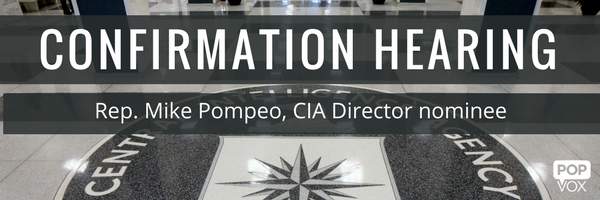This is a special view on the confirmation hearings provided by POPVOX interns from Brown University. We hope you enjoy and learn from their fresh perspective and front-row seat on Capitol Hill.
The Senate Select Committee on Intelligence held a confirmation hearing on Thursday concerning the confirmation of Rep. Mike Pompeo [R, KS-4] as Director of the Central Intelligence Agency (CIA).
Who is Mike Pompeo?
Mike Pompeo is a Republican Congressman representing the 4th District of Kansas. He attended West Point, graduating first in his class. He deployed to Germany where he patrolled the Iron Curtain from 1986 to 1991. Upon his return, he attended Harvard Law School. After that, he worked at the firm Williams and Connolly and started an aerospace manufacturing company. He began serving in Congress in 2011.
What does the Director of the CIA do?
Not surprisingly, the Director of the CIA controls the actions and operations of the CIA. So a more useful question is: what exactly does the CIA do? We’ll never fully know (after all, plenty of its operations are clandestine), but the CIA’s main focus is gathering international intelligence to support the U.S. government, whether through human intelligence operations, cyber operations, or science and technology research. The director reports findings to the executive branch and the legislative branch. On the executive side, he reports to the Director of National Intelligence (DNI), the President, the National Security Council, the President’s Foreign Intelligence Advisory Board, and the Intelligence Oversight Committee. On the legislative side, he reports to the House and Senate Select Committees on Intelligence.
How do confirmation hearings work?
Committees hold confirmation hearings and refer nominations to the full Senate for final vote. Here's a list of committee jurisdictions. Learn more about the Senate's role in the nomination and confirmation process.
Who serves on the Senate Intelligence Committee?
A selection of six Democratic senators and seven Republican senators from a variety of states. The Chairman is Sen. Richard Burr [R, NC] and the Ranking Member is Sen. Mark Warner [D, VA].
What were they talking about?
With the recent DNI report on Russia’s interference in the election, Russia-U.S. relations were a hot topic. The issue emerged early and was referenced often throughout the hearing. Following Sen. Burr’s opening statement, Sen. Warner kicked off the hearing by asking Pompeo if he accepts the report’s conclusions. Pompeo responded that he did. He also criticized Russia for failing to act against ISIS and said that Russia “has a campaign against the U.S,” vowing to carry on a CIA investigation into Russian cyber affairs.
Pompeo was heavily questioned on other cybersecurity issues as well. Sen. Susan Collins [R, ME] referenced how the Department of Defense is subjected to “100,000 attempted cyber attacks per day." Pompeo spoke on the need to strengthen American cyber-defense and named China as another cyber threat in his opening remarks.
The hearing then moved to the question of torture. Pompeo stated that he would “absolutely not allow” torture – including waterboarding – even if it was ordered by the President. Pompeo reiterated that his job is to “always comply with the law” and that he would “work every day to speak truth and demand that [CIA agents] do the same.”
The stance against waterboarding breaks with President-elect Trump’s views, and a large part of the hearing was dedicated to proving Pompeo could operate the CIA without being influenced by others. Sen. Angus King [I, ME], Sen. Ron Wyden [D, OR], and Sen. Dianne Feinstein [D, CA] all expressed worries about outside influence affecting the information the CIA collects and conveys. Pompeo answered that his job is to “tell every government official the facts” and to make decisions independent of outside opinions.
Much like other Cabinet hearings, the committee probed the subject’s ability to transition from a political role to a non-political role, most specifically in the arenas of privacy (as referenced in this op-ed by Pompeo), torture, and the Iran Deal. Pompeo responded to these questions with yet another pledge to follow the law, claiming it would “not be difficult” to go back to a nonpartisan role thanks to his business and military experience.
Learn More:
- Questionnaire
- Opening Statement
- Pre-hearing Questions, follow up questions
- Hearing in less than three minutes, from The Washington Post
- Full hearing, from C-SPAN
- Tell your senator what you think about the nomination!
